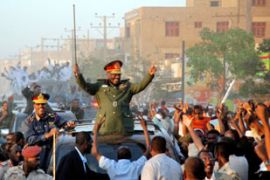Mixed reaction to Bashir warrant
US welcomes decision against Sudanese president but China and others express concern.

“China expresses its regret and worry over the arrest warrant for the Sudan president issued by the International Criminal Court,” Qin Gang, China’s foreign ministry spokesman, said in a statement on the ministry’s website.
“China is opposed to any action that could interfere with the peaceful situation in Darfur and Sudan.”
‘Neo-colonialist policy’
The ICC on Wednesday indicted al-Bashir on seven counts of war crimes and crimes against humanity, which included murder, rape and torture.
The three-judge panel said it had insufficient grounds to consider charges of genocide, though the ICC said the non-inclusion of a genocide charge could change “if additional evidence is gathered by the prosecution”.
The US administration, which has imposed sanctions against Sudan, welcomed the ICC’s decision.
| In depth | ||
|
The UK and France have also been in favour of the warrant while the EU has urged Khartoum to fully co-operate with the ICC.
But their support has added fuel to the fire of those who see the ICC’s decision as “neo-colonialist”.
“They do not want Sudan … to become stable,” Mustafa Osman Ismail, an adviser to al-Bashir.
“The court is only one mechanism of neo-colonialist policy used by the West against free and independent countries.”
Sudan’s UN envoy said the government will drop its campaign to have the UN Security Council delay the al-Bashir’s prosecution for a year and would instead demand that the “criminal plot against our country” be stopped.
The Organisation of Islamic Conference also condemned the decision, with Ekmeleddine Ihsanoglu, its secretary-general, saying that the warrant might negatively affect efforts to solve the crisis in Darfur and could threaten stablity in Sudan and the whole region.
Khartoum protests
The Arab League and African Union are sending delegates to the UN to attempt to persuade the body to delay the implementation of the warrant.
The Rome statute that set up the ICC allows the UN Security Council to pass a resolution to defer or suspend for a year the investigation or prosecution of a case.
Ban Ki-moon, the UN secretary-general, has urged Sudan to co-operate with the court.
In Khartoum, thousands of Sudanese took to the streets soon after the ICC’s decision was announced.
Amr el-Kahky, Al Jazeera’s correspondent, reporting from Khartoum, said that many in Sudan felt the ICC decision threatened the peace process.
“According to the people … it is doing more harm than good,” he said.
“They say it is de-railing and threatening the peace process between the Sudanese government and the rebels in Darfur on the one hand and … [that] the warrant comes at a very bad time, especially after the signing of a memorandum of understanding between the Justice and Equality Movement, the biggest rebel faction in Darfur, and the Sudanese Government in the Qatari capital, Doha.”
Licences revoked
The UN says that up to 300,000 have been killed in Darfur, where the UN is running one of the world’s largest humanitarian missions, while Khartoum says that 10,000 have died.
A further 2.7 million people are estimated to have been uprooted by the conflict, which began when mostly non-Arab rebels took up arms against the government in 2003.
Following the ICC’s decision, Sudan revoked the operating licences of up to 10 aid agencies working in Sudan, the UN said.
Alun McDonald, a spokesman for Oxfam, one of the agencies to have its licence revoked, said it was “going to have a devastating effect on hundreds of thousands of people”.
Save the Children, which supports 50,000 children across Sudan, said its suspension would put thousands of lives at risk.
Sudanese government officials have in the past threatened to take action against Darfur-based aid groups which they say are passing evidence on to the global court’s prosecutor – accusations the agencies deny.

